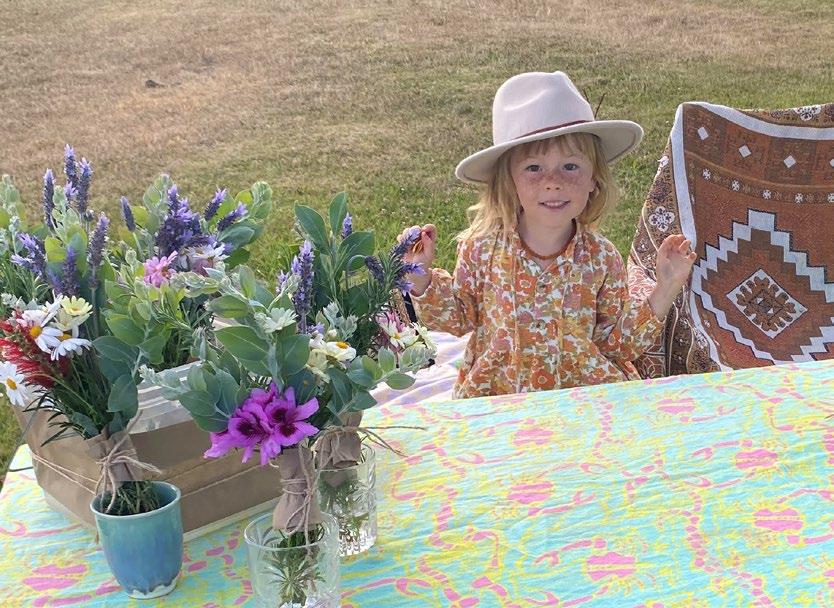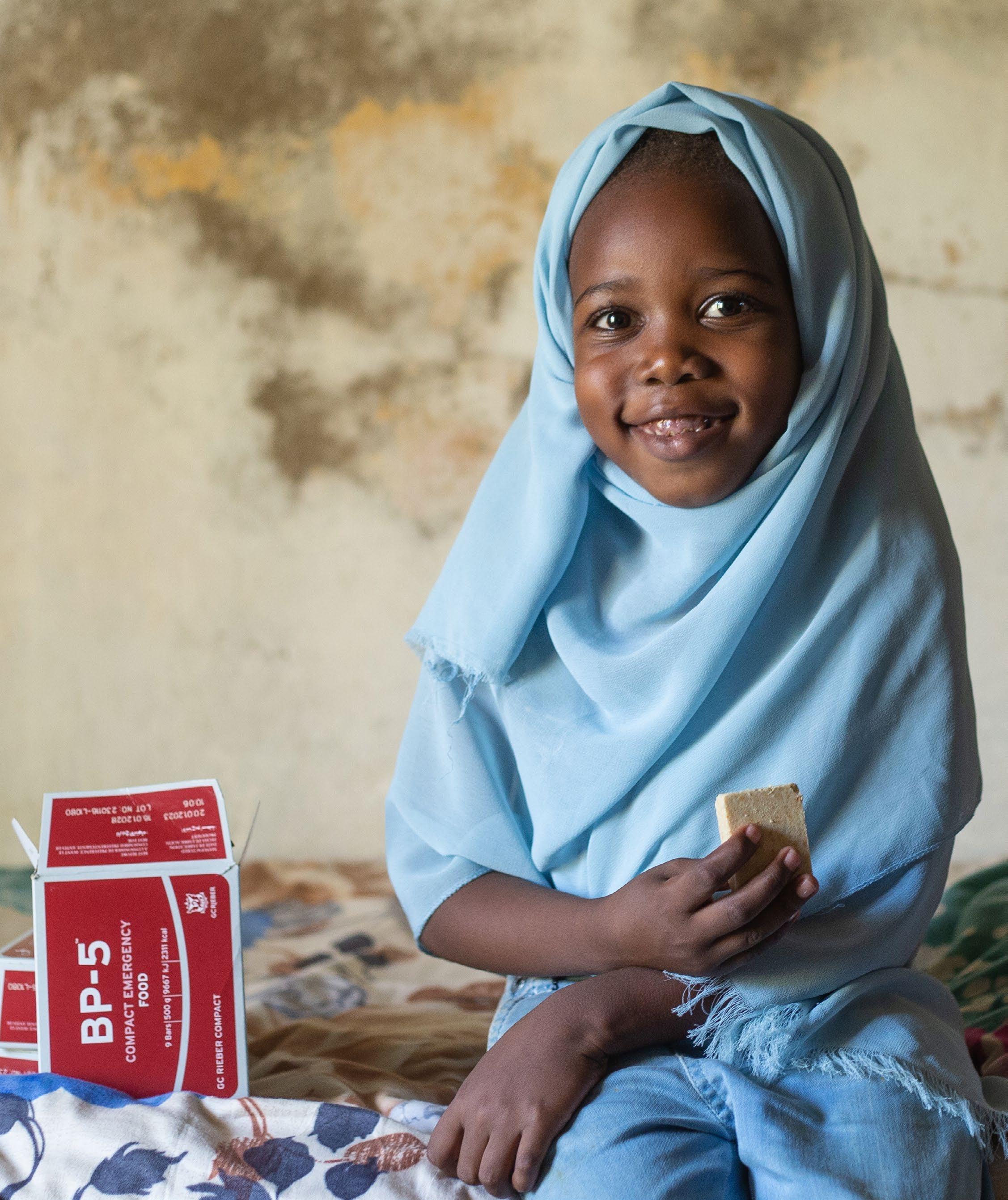
IN THIS ISSUE
Children in crisis in Gaza, Sudan, and beyond
Giving every child a future in the Pacific
Adam Liaw shares a Burundi-inspired dish
Raising youth voices on climate action





Children in crisis in Gaza, Sudan, and beyond
Giving every child a future in the Pacific
Adam Liaw shares a Burundi-inspired dish
Raising youth voices on climate action



As we look back on the profound impact we’ve made for children worldwide, we extend our heartfelt gratitude to the unwavering generosity of all our supporters. Thanks to you, UNICEF’s impact on children has been immense, especially at a time when we are witnessing an unprecedented number of emergencies across the globe.
From conflict and natural disasters to disease outbreaks and malnutrition, we remain committed to delivering lifesaving emergency relief and long-term development solutions for every child in need. Whether helping children and their communities recover after devastating earthquakes in Syria, Türkiye and Afghanistan, or responding to floods in Libya and Madagascar, UNICEF is always there.
In Sudan, where violence has triggered the world’s largest child displacement crisis, or the many other emergencies that often go unnoticed by the media, your unfaltering donor support ensures that we are there for children before, during and after an emergency. For this, we thank you.
In October 2023, hostilities in Gaza and Israel quickly escalated into a catastrophic humanitarian situation. Children and their families are enduring immense loss and trauma. In this extremely complex, highrisk security environment, and in the most extreme conditions, our UNICEF colleagues deliver desperately needed lifesaving supplies and support services to children in need.
Climate remains a critical priority for us. We are actively supporting communities in developing and implementing climateresilient strategies to withstand the impacts of climate change. Additionally, we advocate for the rights of children in the online world through our online safety campaign, which was launched in March.
In this issue, we share stories of the impact you’ve helped create for children here in Australia and around the world. Your continued support of UNICEF Australia is making a difference in the lives of children and young people. Thank you!
Tony Stuart Chief Executive Officer
On the cover A young boy who is recovering from malnutrition has his weight measured as part of the Maman Lumière program in Burundi. © UNICEF/UNI504539/Seabra Top A child participates in an art therapy session at one of UNICEF’s Spilno Child Spots in Ukraine. © UNICEF/UN0819983/ Skyba Bottom left Bwatera’s six-week-old son is one of the thousands of children who received their routine vaccinations as part of the ‘Rotary Give Every Child a Future’ program. © UNICEF Australia and Rotary/2023/Lehn
UNICEF Australia Young Ambassadors Aston, Denzel, Luke and Peta debunk three common myths about social media and young people.
In today’s tech-driven world, there are a lot of negative opinions about young people’s relationship with social media. We spoke with some of our Young Ambassadors to share their experiences and debunk some of these myths.
The Young Ambassadors agreed that they and the people in their lives struggle to put down their phones, especially since the pandemic. But they said the problem didn’t affect everyone, with some young people not using social media at all. They pointed out that while the blame is often put on young people, social media apps are designed to be addictive in the first place.
The Young Ambassadors said that they and their friends generally don’t take information they see on social media at face value and try to get their information from reliable sources. But they still knew people of all generations who have shared misinformation online.
In our recent survey, 81 per cent of young Australians aged 15 to 17 said social media has a positive impact on their lives. The Young Ambassadors generally agreed, saying they used social media for positive reasons including connection and education. “It provides a lot of opportunity for young people to be engaged and in different ways,” Luke said. But they were aware of the risks of being online and agreed everyone’s experience was different.


It’s very easy to get stuck in an echo chamber and anyone can be vulnerable to misinformation. It’s always good to confirm that information is accurate and real just by checking multiple sources .
- ASTON, 22
WANT TIPS AND RESOURCES TO HELP YOU NAVIGATE YOUR YOUNG PERSON’S ONLINE EXPERIENCE? CHECK OUT OUR ONLINE SAFETY HUB!
Thanks to your generosity, children in crisis are getting the urgent support they need.
Emergencies in Gaza, Ukraine, and Sudan continue to disrupt children’s lives. In countries like Yemen and Haiti, conflicts and climate shocks are causing destruction and uncertainty for millions. But with the help of people like you, UNICEF is always there for children, providing immediate and long-term support before, during and after emergencies.

As families flee their homes due to the ongoing conflict in Sudan, nutritious food is hard to find. Malnutrition was already a challenge in Sudan, but the war is pushing the country towards famine. Today, Sudan has one of the highest child malnutrition rates in the world.
Your support allows UNICEF and our partners to help screen children under five years of age like little Aida (above), for severe malnutrition and refer them for treatment, including ready-to-eat therapeutic food.
For decades, the children of Haiti have endured natural disasters, disease outbreaks, political instability, gang violence, and poverty. The situation continues to deteriorate after a surge in unrest in the capital, Port-au-Prince, in early 2024. Now, a record two in three children in Haiti need urgent humanitarian assistance.
With your help, UNICEF and our partners are giving children and families access to safe water, sanitation, and hygiene (WASH) supplies to protect the health of little ones against preventable diseases like cholera.


Nearly a year since the conflict escalated, every child in the Gaza Strip has been exposed to deeply distressing events, including relentless attacks, displacement, and severe shortages to essentials like food, water, and medicine. UNICEF continues to call for an immediate and permanent ceasefire and for all parties to protect children from harm.
Despite the ongoing challenges, your support is helping us continue to preposition supplies and move them into Gaza whenever possible, including essential baby supplies to new mothers like Noura (above).

Nine years of conflict have left Yemen on the verge of collapse, with over half the population requiring humanitarian assistance, including more than 9.8 million children. Climate shocks are exacerbating the complex situation in this water-scarce nation, leaving children vulnerable to malnutrition and diseases due to unclean water.
Thanks to the kindness of people like you, UNICEF and our partners are rehabilitating the piped water network in hotspot areas including Amran city (pictured above), so children and families can access the safe water they need.

After more than two years of war, more than 2.9 million children need humanitarian assistance in Ukraine. UNICEF is running 150 centres and 50 mobile services across Ukraine to connect children with learning programs to continue their education, as well as health services and recreational activities. They’re called Spilno Child Spots and are some of the only places where children like two-year-old Carolina (above) can go to escape the horrors of war. Your generosity is giving children hope for a brighter future.
TOGETHER, WE CAN SUPPORT CHILDREN IN CRISIS. DONATE NOW.
From Papua New Guinea to Kiribati, your support is helping children across the Asia Pacific.

© UNICEF/UNI494317/Moran
How UNICEF is helping children like Jeremaiah recover from malnutrition
It takes 41-year-old Noris a whole day to walk to the nearest health clinic with her six-monthold baby, Jeremaiah – a journey she rarely makes because of the distance and poor weather.
Leaving her six other children at home, Noris visits the health clinic for the first time since Jeremaiah was born. As part of the check-up, the health worker also screens Jeremaiah for malnutrition.
Despite being so close to Australia, the reality of life for children in Papua New Guinea (PNG) couldn’t be more different. Many children and families face a range of
challenges including a fragile health system and a lack of access to safe water, and more than half of all children under five are malnourished.
With support from the Australian Government through the PNG Aus Partnership and with partners like Islamic Relief Australia, UNICEF Australia is supporting long-term development programs in PNG to help children survive and thrive, focusing on investing in the early years, keeping mums and their babies healthy, protecting children from harm and unlocking the potential of PNG’s young people.
I used to stay in my village because my village is far, but I heard UNICEF was coming, so I decided to walk to get some information. I didn’t know my child has severe acute malnutrition (SAM), I just came and I found out. They gave him medicine and told me to feed him proper meals and to bring him back frequently to get treatment so he can be healthy again.
– Noris, mother of seven
Every child deserves a future, but sadly, in the Pacific, preventable diseases are among the top causes of mortality for children aged under five. But thanks to the support of the Rotary Give Every Child a Future program, we’ve been working with Pacific governments to provide lifesaving vaccines in some of the hardest-to-reach communities over the past four years. Together we’re ensuring every child in the Pacific can reach their full potential.
We are pleased to announce that access to these vaccines will continue post-2025 after nine Pacific governments committed to adding vaccines for pneumococcal disease, rotavirus, and human papillomavirus (HPV) to their National Programs for Immunisation. These lifesaving vaccines will have a lasting impact on the health and wellbeing of children and young people in Vanuatu, Samoa, Tonga, Tuvalu, Cook Islands, Nauru, Niue, Tokelau and Kiribati.
As the world’s largest supporter of routine immunisation for children, UNICEF will continue to support programs like these in the Pacific to ensure that all children and adolescents can live healthy, happy futures.
Thanks to the support of generous people like you and partners like Rotary, UNICEF can reach more children with lifesaving vaccines to give every child, everywhere, a future. Together, we can support governments, communities and local partners in the Pacific and beyond, creating a ripple effect of good health practices for generations to come.
We congratulate the Pacific nations committing to the vital work Rotary started with UNICEF and the Ministries of Health for the benefit of the youngest Pacific Islanders for decades to come.
– James Allen, Rotary Project Director


Your impact in action

5.9 million
Raised by Rotary Foundation, Rotary Zone 8 Australia and New Zealand, and DFAT for the program.

More than 100,000 Children and young people in the Pacific will be reached with lifesaving vaccines.

More than 260,000
Caregivers given the knowledge and skills to adopt recommended immunisation practices.

Whether you host a bake sale, sausage sizzle, potluck, or morning tea, the money you raise will help UNICEF deliver lifesaving help for children in emergencies, from Gaza to Ukraine, Sudan and beyond.
#CookForKids is the most delicious fundraising event on the UNICEF calendar. Thank you so much to those who have already gotten involved – but it isn’t too late to sign up! By registering for a #CookForKids fundraiser at cookforkids.unicef.org.au, you’ll get an exclusive digital cookbook featuring recipes from renowned chefs including UNICEF Australia Ambassador Adam Liaw to get you started. Here’s just a taste:
(Tuna and vegetable stew)
Prep 10 mins Cook 30 mins Serves 4
● 1 tbsp vegetable oil
● 1 onion, peeled and diced
● 1 carrot, peeled and diced

“Mélange is a popular dish in Burundi, a landlocked country in east Africa. It’s a colourful mix of ingredients which often includes beans, vegetables, and dried fish. When I visited Burundi with UNICEF Australia last year, I made mélange with the wonderful Mamans Lumières (Light Mothers), a community-led program supported by UNICEF, which provides treatment and support for children with moderate acute malnutrition. This version is adapted to use ingredients you can find at the supermarket. Eat it on its own or with rice, bread, or bugali, a maize meal porridge that goes by many names throughout east Africa.”

● 1 potato (or sweet potato), peeled and diced
● 1 can four bean mix (420 g), rinsed and drained
● 1 can diced tomatoes (400 g)
● 1 tsp vegetable stock powder
● salt to season
● 3 cups loosely packed baby spinach leaves
● 185g tinned tuna in spring water
● ¼ cup ground peanuts (or agashe), to serve
1 Heat a medium saucepan over medium heat and add the oil, onion, carrot and potato. Fry the vegetables for a few minutes, then add the beans, tomatoes, stock powder and 2 cups (500 ml) of water. Bring to a simmer, season with salt to taste and simmer for 25 minutes.
2 Stir through the baby spinach leaves and tuna and then mash a few of the beans and vegetables to thicken the stew. Serve scattered with ground peanuts.
There are so many creative ways supporters of all ages have raised money for children this year
Melbourne mum Belinda celebrated her 40th birthday by shaving her hair off to support children in Gaza.
Raised $3,282

Four-year-old Kingston and her mum were inspired to raise money for our Gaza emergency appeal by creating beautiful bouquets from the flowers from their garden and selling them at a flower stall.
Raised $400


Instead of presents, Kei asked his friends to donate to UNICEF’s #CookForKids fundraiser for his birthday. He practiced baking with his mum and made madeleines and other yummy treats to share with his friends.
Raised $1,225


Susan’s gift for future generations
Susan is a long-time UNICEF Australia donor who has left a gift in her Will. After working in healthcare for over four decades, including volunteering in Ethiopia to help run free vaccination programs for children, Susan knows the importance of a happy and healthy childhood.
“I strongly believe that supporting children and helping them have a safe, nurturing, fulfilling start in life is good for not only the individual child but for humanity and the world,” Susan says. “If children grow up in their communities and are loved, educated and valued, they become good citizens.”
The gift in my Will can make a positive impact on the lives of children around the world, today and in years to come.
- Susan Day
If you want to leave a legacy for future generations, you can contact our friendly Gift in Wills team at giftsinwills@unicef.org.au or on 1300 884 233
Young people want a seat at the table when it comes to decision-making on climate action... Here’s what they had to say
Children and young people are set to bear the brunt of the climate crisis, but they’re typically excluded from decisionmaking processes. They want to have an active role in creating and implementing climate solutions to ensure the world they, and future generations, inherit fulfils their basic needs, rights, and aspirations.
In a world-first project, UNICEF Australia partnered with the Young & Resilient Research Centre at Western Sydney University to develop a
practical tool to measure how climate change affects children and young people, and how climate action benefits them. This tool is called Child-Centred Indicators for Climate Change.
To do this, we spoke to children and young people from three climate-affected communities in New South Wales – the Northern Rivers, Upper Hunter, and Western Sydney –about their experiences with climate change and climate action, as well as their ideas, aspirations and more.
FIVE KEY FINDINGS FROM THE REPORT
[The] sense of responsibility and burden put on teenagers to create change and solve a climate crisis that they did not start... this can take time from their education, self-care and simply growing up.
– 15, female, Western Sydney
The agricultural industry is one of the largest polluters and needs to change their process enough to save land and water for future generations.
– 17, male, Northern Rivers
CLICK TO READ THE FULL REPORT HERE
1 2 3 4 5
They feel let down by older generations and that their generation bears the burden of fixing climate change.
They understand that climate change impacts every aspect of their lives, and they want everyone to be educated about it.
They experience climate change differently depending on where they live. The climate action they want to see would differ from place to place.
They want governments and corporations to act, stop making things worse, and start reversing climate change.
They want meaningful ways to participate in climate action so that they can help shape a better future.
We have the most at stake, and yet we do not have a stake. We are left out of climate action planning. We watch on while decisions about our lives are made but we do not get a seat at the table.
– Yehansa, 16, report co-researcher
[I want] to have a clean and better future in which we stop using gases that can and will pollute the air, and we stop cutting down trees.
– 12, female, Upper Hunter


Year 11 student and report co-researcher Yehansa, 16, is an active volunteer with the Australian Youth Climate Coalition, which advocates for climate justice. She started a grassroots advocacy group in her area and is passionate about developing and implementing equitable climate change solutions.
I wish for one thing... That is for young people to be genuinely included in decision-making spaces: not to just speak at conferences or be part of advisory bodies after decisions are made, but to be active participants in the process.
